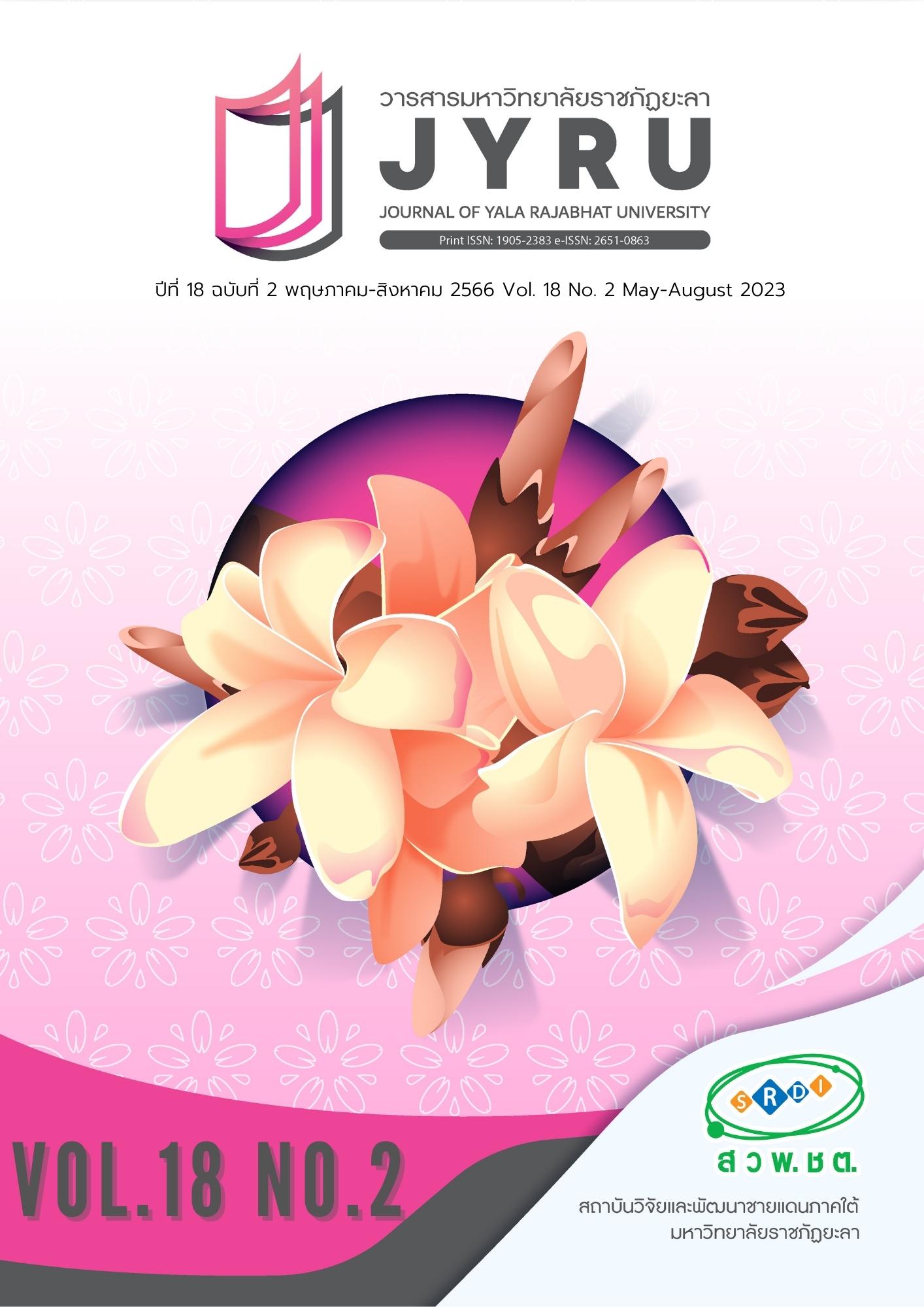การซื้อพืชผักปลอดสารพิษในราคาที่สูงกว่าพืชผักทั่วไปของประชาชนสามจังหวัดภาคใต้ตอนล่างของไทย
Main Article Content
บทคัดย่อ
สารพิษตกค้างในพืชผักยังคงเป็นปัจจัยเสี่ยงต่อผู้บริโภค จึงวิจัยการซื้อพืชผักปลอดสารพิษในราคาที่สูงกว่าพืชผักทั่วไป เพื่อศึกษาราคาซื้อที่ประชาชนในจังหวัดปัตตานี ยะลา และนราธิวาสยอมรับได้และเปรียบเทียบความแตกต่างในการซื้อตามกลุ่มอายุ ระดับศึกษา อาชีพและรายได้ โดยวิธีการสำรวจข้อมูลกับกลุ่มตัวอย่างแบบบังเอิญ จำนวน 338 คน วิเคราะห์ข้อมูลหาค่าความถี่ ร้อยละ และความแตกต่างระหว่างกลุ่มด้วยไคสแควร์ตามวิธีของครัสคาล-วัลลิสพบว่า ประชาชนร้อยละ 68.93 ยังคงซื้อพืชผักปลอดสารพิษถึงแม้มีราคาสูงกว่าพืชผักทั่วไป ร้อยละ 69.53 ยอมรับในราคาที่สูงกว่าราคาพืชผักทั่วไปไม่เกินร้อยละ 10 การวิเคราะห์เปรียบเทียบพบว่า ประชาชนแต่ละอาชีพพิจารณาซื้อพืชผักปลอดสารพิษในราคาที่สูงกว่าพืชผักทั่วไปต่างกันอย่างมีนัยสำคัญยิ่งทางสถิติ (<0.01) ส่วนประชาชนที่มีช่วงอายุและรายได้ต่อเดือนต่างกัน มีการซื้อพืชผักปลอดสารพิษในราคาที่สูงกว่าพืชผักทั่วไปที่ต่างกันอย่างมีนัยสำคัญทางสถิติ (<0.05) ในขณะที่ประชาชนที่มีระดับการศึกษาต่างกัน มีการซื้อพืชผักปลอดสารพิษในราคาที่สูงกว่าพืชผักทั่วไปไม่ต่างกันทางสถิติ ดังนั้นการผลิตพืชผักปลอดสารพิษหรือการทำการเกษตรปลอดภัยยังคงมีโอกาสทางการตลาดเพราะผู้บริโภคยอมรับในราคาที่สูงกว่าพืชผักทั่วไปได้ แต่อย่างไรก็ตามผู้ผลิตหรือผู้ขายไม่ควรขายในราคาที่สูงจนเกินความเหมาะสม
Article Details

อนุญาตภายใต้เงื่อนไข Creative Commons Attribution-NonCommercial-NoDerivatives 4.0 International License.
บทความ ข้อมูล เนื้อหา รูปภาพ ฯลฯ ที่ได้รับการเผยแพร่ในวารสารมหาวิทยาลัยราชภัฏยะลานี้ ถือเป็นลิขสิทธิ์ของวารสารมหาวิทยาลัยราชภัฏยะลา หากบุคคลหรือหน่วยงานใดต้องการนำทั้งหมดหรือส่วนหนึ่งส่วนใดไปเผยแพร่ต่อหรือกระทำการใดๆ จะต้องได้รับอนุญาตเป็นลายลักษณ์อักษรจากวารสารมหาวิทยาลัยราชภัฏยะลาก่อนเท่านั้น
เอกสารอ้างอิง
Asiry, K. A., Hassan, S. S., & Airashidi, M. M. (2013). Factors affecting agricultural sustainability – A case study of hail region, Kingdom of Saudi Arabia. Asian Journal of Agriculture and Rural Development, 3(10), 674-687
Boonchuai, P. (2018). Factors analysis and grouping consumption of organic vegetable in Nakhonpathom. Journal of Thonburi University, 12(28), 52-63. (in Thai)
Damalas, C.A. (2009). Understanding benefits and risks of pesticide use. Scientific Research and Essays 4(4), 945–949.
Diffley, J. (2022). Is buying organic produce worth the cost? [Online]. Retrieved December 11, 2022, from: https://selecthealth.org/blog/2019/03/is-buying-organic-worth-the-cost
Ha, T. M., Shakur, S., & Pham Do, K. H. (2019). Rural-urban differences in willingness to pay for organic vegetables: Evidence from Vietnam. Appetite 141(1), 1-8.
Henson, S., & Reardon, T. 2005. Private agri-food standards: Implications for food policy and the agri-food system. Food Policy 30(3), 241–253.
Kamonnorathep, P. (2021). The future of organic food as Gen Y becomes more health care. [Online]. Retrieved December 11, 2022, from: https://www.greenery.org/articles/trend-organic-generation-y/. (in Thai)
Kongsat, S. & Thammawong, T. (2008). Finding the congruence of the questionnaire (IOC) [Online]. Retrieved March 25, 2021, from: https://www.mcu.ac.th/article/detail/14329. (in Thai)
Kotler, P. (2000). Marketing management: The millennium edition (Vol. 199). Upper Saddle River, NJ: Prentice Hall.
Ministry of Labour. (2021). Minimum wage rate [Online]. Retrieved December 18, 2021, from: https://www. mol.go.th. (in Thai)
Mir, S. A., Dar, B. N., Mir, M. M., Sofi, S. A., Shah, M. A., Sidiq, T., Sunooj, K. V., Hamdani, A. M., & Mousavi Khaneghah, A. (2021). Current strategies for the reduction of pesticide residues in food products. Journal of Food Composition and Analysis 4(11), 0889-1575.
National Statistical Office Thailand. (2020). Labor statistics [Online]. National Statistical Office, Ministry of Digital Economy and Society. Retrieved March 17, 2021, from: http://statbbi.nso.go.th/ staticreport/page/sector/th/index.aspx (in Thai)
Office of the Education Council. (2020). Average academic year of the Thai population 2020 [Online]. Retrieved December 18, 2021, from: http://www.onec.go.th/th.php/page/view/Outstand/ 4449 (in Thai)
Office of the National Economics and Social Development Council. (2021). Thailand Economic Report 2021 [Online]. Retrieved December 18, 2021, from: https://www.nesdc.go.th/ewt_news.php?nid=11555 (in Thai)
Qin, G., Li, Y., Chen, Y., Sun, Q., Zuo, B., He, F., Shen, N., Jia, G., & Ding, G. (2015). Pesticide residues determination in China vegetables in 2010-2013 applying gas chromatography with mass spectrometry. Food Research International 72(3), 161–167.
Strategic Management Group of Southern Border Provinces. (2020). The Development Plan of the Southern Border Provinces Group, 2019–2021 [Online]. Retrieved December 1, 2021, from: http://www.osmsouth-border.go.th/files/com_news_develop/2017-2_73fceae677e4d82.rar (in Thai)
Sukkarat, K. & Athinuwat, D. (2020). Study of consumption behavior and attitude of organic product consumer. Thai Journal of Science and Technology, 9(1), 68-76. (in Thai)
Sukchoknitipoekin, T. (2019). Factors influencing consumers’ purchasing behavior on non-toxic vegetables in Nonthaburi Province. Humanities and Social Science Research Promotion Network Journal, 2(2), 46-55. (in Thai)
Tancharoen, M. (2017). Comsumption behaviour of pesticide residue free vegetables : A case study of Tambon Donchedi, Amphoe Phanom Thuan, Kanchanaburi. Dhonburi Rajabhat University Journal, 11(1), 35-45. (in Thai)
Tepwong, P. (2013). Perception and consumption behavior on pesticide free vegetable of municipal school teachers in Khon Kaen municipality, Khon Kaen province. MBA-KKU Journal, 6(1), 41-52. (in Thai)
Wanwimolruk, S., Duangsuwan, W., Phopin, K., & Boonpangrak, S. (2017). Food safety in Thailand 5: the effect of washing pesticide residues found in cabbages and tomatoes. Journal Fur Verbraucherschutz Und Lebensmittelsicherheit, 12(3), 209–221. https://doi.org/10.1007/s00003-017-1116-y
Wongyos, N. (2021). Factors affecting the consumer decision to purchase organic vegetablesin Phayao Province agricultural market. SAU Journal of Social Sciences & Humanities, 5(1), 121-131. (in Thai)


